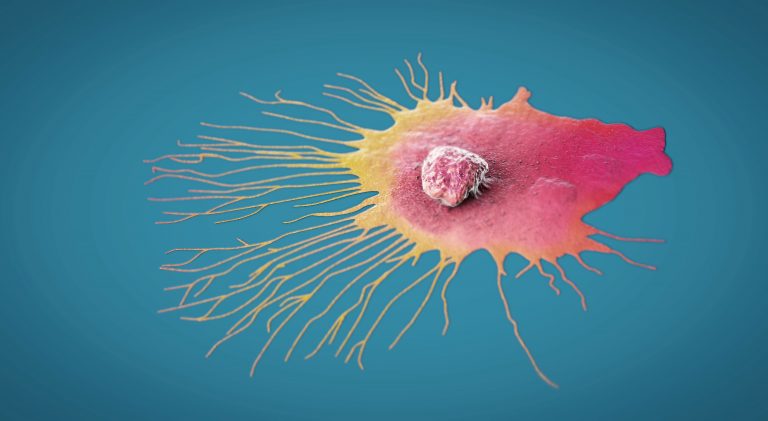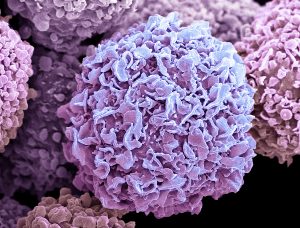
Researchers at the Georgetown Lombardi Comprehensive Cancer Center have identified a combination of genes and other factors that can determine if a woman is at risk for recurrence of breast cancer.
The team’s discovery is published in Scientific Reports and could provide new research avenues for preventing a new tumor from developing. It was made by using an advanced technology developed at Georgetown Lombardi that allows laboratory researchers to expand, or multiply, hard-to-extract breast tissue cells.
“Biology and transcriptomes of non-cancerous human mammary epithelial cells at risk for breast cancer development were explored following primary isolation utilizing conditional reprogramming cell technology from mastectomy tissue ipsilateral to invasive breast cancer. Cultures demonstrated consistent categorizable behaviors. Relative viability and mammosphere formation differed between samples but were stable across three different mammary-specific media,” write the investigators.
“E2F cell cycle target genes expression levels were positively correlated with viability and advancing age was inversely associated. Estrogen growth response was associated with Tissue necrosis factor signaling and Interferon alpha response gene enrichment. Neoadjuvant chemotherapy exposure significantly altered transcriptomes, shifting them towards expression of genes linked to mammary stem cell formation.
“Breast cancer prognostic signature sets include genes that in normal development are limited to specific stages of pregnancy or the menstrual cycle. Sample transcriptomes were queried for stage specific gene expression patterns. All cancer samples and a portion of high-risk samples showed overlapping stages reflective of abnormal gene expression patterns, while other high-risk samples exhibited more stage specific patterns.
“In conclusion, at-risk cells preserve behavioral and transcriptome diversity that could reflect different risk profiles. It is possible that prognostic platforms analogous to those used for breast cancer could be developed for high-risk mammary cells.”
Focused on breast epithelial cells
The researchers focused on breast epithelial cells, which are the layer of cells that form the ducts and lobes which make milk during lactation. The scientists, who extracted these cells from donated non-cancerous tissue in the same breast as the one that had cancerous tissue removed during a mastectomy, were looking for numerous factors that could kick-start recurrence, but their main target was the transcriptome that helps determine when and where each gene is turned on or off in a cell.

Even though surgical techniques continue to improve, undetectable microscopic pieces of tumor can remain and are one factor for recurrence of breast cancer in up to 15 percent of women, sometimes years after surgery; people with hormone-receptor positive breast cancer have the highest risk of recurrence.
When analyzing expanded epithelial cells from women who had chemotherapy before their surgery, the researchers found significantly altered RNA. In particular, they saw significant changes in genes that had previously been recognized as prognostic indicators for cancer.
“When a person is diagnosed with breast cancer, we have several tools, including testing for genes such as BRCA1/2, to decide whether they should get certain kinds of chemotherapy or just receive hormonal therapy. But the tools we have are not as precise as we would like,” says Priscilla Furth, MD, professor of oncology and medicine at Georgetown Lombardi and corresponding author of the study.
“About one in eight women are diagnosed with breast cancer in the developed world. We hope that our findings will help lead to more precise and directed screening in the future, sparing women unneeded procedures as we currently screen almost all women between the ages of 40 to 70, sometimes very aggressively.”
Implications for women who have not had breast cancer
The researchers also noted that there are implications for women who have not had breast cancer as some of the RNA alterations were linked to mammary stem cell formation. Stem cells are self-renewing and related to growth and development.
Mammary stem cells are adult stem cells that can differentiate, or change function, into specialized mammary epithelial cells. If these cells get dysregulated, there is an increased potential for cancer. Cells from pregnant women were of particular interest to the researchers as pregnancy usually triggers extra renewing cycles in a cell, potentially increasing the risk of cancer.
The team cited the key role of the conditionally reprogrammed cells (CRC) technique (that was invented and patented at Georgetown) in its work. The study used CRC for the initial isolation of epithelial cells. CRC is the only known system that can indefinitely grow healthy as well as cancer cells; up to a million new cells can be grown in a week, according to the researchers.
The scientists also point out that in the past one of the main problems in studying these cells was that epithelial cell cultures were often contaminated with the other cell types, particularly fibroblasts which grow very quickly in culture while epithelial cells grow a bit slower. Primary tumor cells also can be difficult to isolate but the researchers had increased success using the CRC technique compared to conventional methods.













